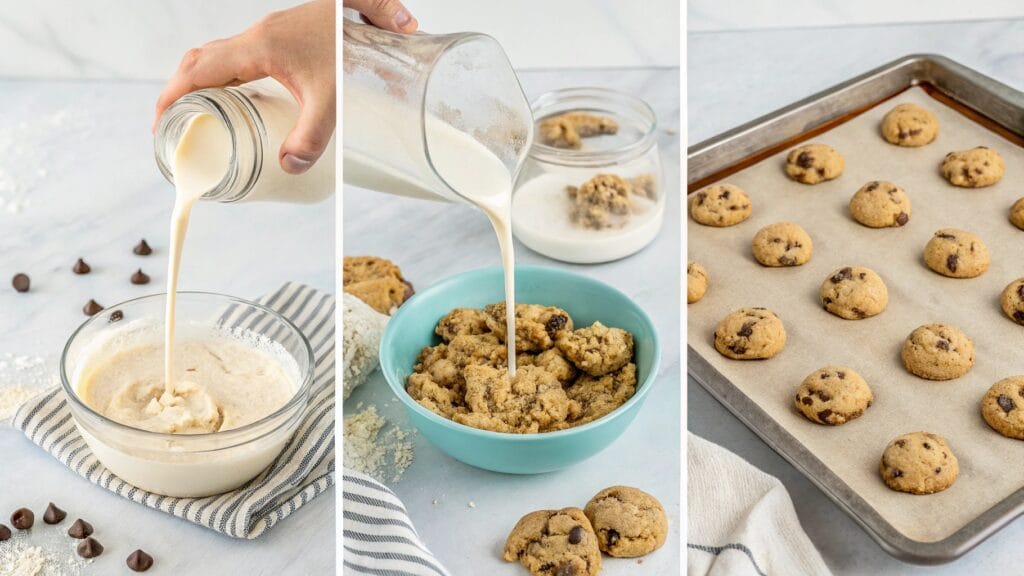Baking enthusiasts are always on the hunt for ways to make their treats extra special. One common question that arises when using boxed mixes is, “Can you use milk instead of water in Betty Crocker cookie mix?” The short answer is yes, but there’s a lot more to uncover! This article dives into the benefits, drawbacks, and practical tips for making this simple substitution. By the end, you’ll know how to elevate your cookies with ease.
Let’s start by understanding the basics of Betty Crocker cookie mix and why water is the standard choice.
Understanding Betty Crocker Cookie Mix Instructions
Standard Preparation Guidelines for Betty Crocker Cookie Mix
Betty Crocker cookie mixes are a lifesaver for both beginner and seasoned bakers. Typically, the instructions call for adding water, oil, and an egg to the dry mix. Water serves as a neutral liquid that hydrates the flour and activates other ingredients like baking powder.
Why water? It’s inexpensive, universally available, and doesn’t interfere with the mix’s original flavor profile. However, water’s neutrality is also its downside—it doesn’t add anything extra to your cookies.
Role of Water in Cookie Mix Recipes
Water plays a crucial role in achieving the right dough consistency. It helps bind the dry ingredients together, ensuring an even texture throughout the cookie. However, because it lacks fats or sugars, it doesn’t contribute to the richness or depth of flavor in your cookies.
This opens the door to experimenting with alternatives, like milk. By replacing water with milk, you can add a subtle creaminess and enhanced flavor to your cookies without altering the simplicity of the preparation process.
So, what happens when you ditch water for milk? We’ll explore that in the next section.
Exploring the Substitution of Milk for Water
Feasibility of Using Milk Instead of Water in Cookie Mixes
Can you use milk instead of water in Betty Crocker cookie mix? Absolutely! Substituting milk for water is not only feasible but also a popular tweak among bakers. Milk, with its natural fats and proteins, brings more to the table than water ever could. It enhances both the texture and flavor of the cookies, giving them a richer, creamier bite.
However, before you grab that carton of milk, it’s essential to understand how it interacts with the ingredients. Milk’s additional nutrients can slightly alter the chemistry of your dough, making it softer and more pliable. This means your cookies might spread a little differently in the oven compared to the water-based version.
Potential Effects on Cookie Texture and Flavor
Swapping water for milk has a noticeable impact on your cookies’ texture and flavor. Milk’s fats contribute to a tender, melt-in-your-mouth texture. At the same time, its natural sugars caramelize during baking, enhancing the overall sweetness and giving your cookies a golden-brown hue.
But there’s a trade-off. Milk can make the dough stickier, which might make it trickier to handle. You might also need to bake the cookies a minute or two longer, as milk-based dough takes slightly more time to set.
In the end, the substitution is worth it for anyone craving cookies with a homemade feel—full of depth and warmth, unlike the standard water-based version.

Benefits of Using Milk in Cookie Mixes
Enhanced Flavor Profiles with Milk
Milk works w onders in amplifying the flavor of Betty Crocker cookie mix. Its natural c reaminess blends seamlessly with the mix, adding richness to every bite. Whether you’re using whole milk, skim milk, or even a non-dairy alternative like almond milk, each type brings a unique twist to the final product.
For instance, whole milk intensifies the cookies’ buttery notes, while almond milk adds a subtle nutty flavor. This versatility makes milk an excellent choice for bakers looking to experiment.”Enhancing Betty Crocker Cookie Mix: Substituting Milk for Water”
Improved Texture and Moisture Content
One of the standout benefits of using milk is the superior texture it creates. The fats in milk lock in moisture, preventing your cookies from drying out. This is particularly useful if you prefer chewy cookies that stay soft even after cooling.
Additionally, milk contributes to a fluffier, lighter crumb, making each bite feel like a treat straight out of a gourmet bakery. For bakers wondering, “Can you use milk instead of water in Betty Crocker cookie mix?” the answer is a resounding yes—especially if you’re after cookies that are both flavorful and irresistibly tender.
Potential Drawbacks and Considerations
Possible Changes in Dough Consistency
While substituting milk for water in Betty Crocker cookie mix can enhance flavor and texture, it’s important to note that this change may affect the dough’s consistency. Milk introduces additional fats and proteins, which can make the dough slightly stickier and more challenging to handle. To manage this, consider chilling the dough for 15-30 minutes before shaping it. This step can make the dough firmer and easier to work with, ensuring your cookies maintain their intended shape during baking.
Impact on Baking Time and Final Product
Enhancing Betty Crocker Cookie Mix: Substituting Milk for Water Introducing milk into the mix can also influence baking time. The added moisture may require a slight increase in baking duration to achieve the desired doneness. It’s advisable to monitor the cookies closely during the baking process and perform a doneness test, such as inserting a toothpick into the center, to ensure they are baked through. Additionally, the extra sugars in milk can cause the cookies to brown more quickly, so keep an eye on them to prevent over-browning.
Expert Opinions and User Experiences
Insights from Professional Bakers
Professional bakers often recommend experimenting with ingredient substitutions to achieve desired results. According to discussions on baking forums, many suggest that replacing water with milk in baking recipes can enhance flavor and texture due to the fats and proteins present in milk. However, they also caution that this substitution may alter the consistency of the batter or dough, and adjustments might be necessary to achieve optimal results.
Home Bakers’ Experiences and Testimonials
Home bakers have shared their experiences with substituting milk for water in Betty Crocker cookie mixes. One user on a popular baking forum mentioned that using milk instead of water resulted in a richer flavor and softer texture in their cookies. However, they also noted that the dough was slightly stickier and required additional flour to reach the desired consistency. Another user reported that while the substitution improved the taste, it also caused the cookies to spread more during baking, suggesting the need for slight adjustments in baking time and temperature.
For more delicious red velvet cake and baking tips, check out our recipe article.
Step-by-Step Guide to Substituting Milk in Your Cookie Mix
Recommended Milk Types and Quantities
If you’re wondering, “Can you use milk instead of water in Betty Crocker cookie mix?” the answer is a confident yes! To start, replace the water in the recipe with an equal amount of milk. For instance, if the mix calls for 3 tablespoons of water, simply use 3 tablespoons of milk instead. Whole milk works best for richer, creamier cookies, but you can also use skim milk or non-dairy options like almond, oat, or soy milk for a unique flavor twist.
Keep in mind that thicker milk varieties, like cream or half-and-half, may require slight adjustments to the other ingredients. Adding a touch of extra flour can help balance the dough’s consistency if needed.
Adjustments to Baking Process When Using Milk
Substituting milk for water might require small tweaks to your baking routine. Milk-based dough tends to be stickier, so lightly flour your hands or utensils when shaping cookies. Additionally, monitor the cookies as they bake; milk’s natural sugars caramelize, so the cookies might brown faster. Lowering the oven temperature by 5-10 degrees can help achieve evenly baked cookies with a golden finish.”Enhancing Betty Crocker Cookie Mix: Substituting Milk for Water”
For more tips on perfecting cookie recipes, check out our ultimate cookie guide.
FAQ
Can I use milk instead of water in Betty Crocker cookie mix?
Yes, you can! Using milk instead of water is a simple way to add richness and enhance the flavor of your cookies. It’s a popular choice among bakers looking to upgrade their boxed mix.
Can you substitute milk for water in cookie mix?
Absolutely. Milk works as a direct substitute for water in most cookie mixes. The result is cookies that are softer, moister, and more flavorful.
What happens if you use milk instead of water in baking?
When you swap water for milk, you add fats and proteins to the recipe, which improve the texture and depth of flavor. However, this can also make the batter or dough slightly stickier and may require adjustments to baking time.
What happens when you add milk to cookie batter?
Adding milk to cookie batter makes the cookies softer and richer. The fats in milk help retain moisture, while the natural sugars enhance the sweetness and contribute to a golden-brown color during baking.

